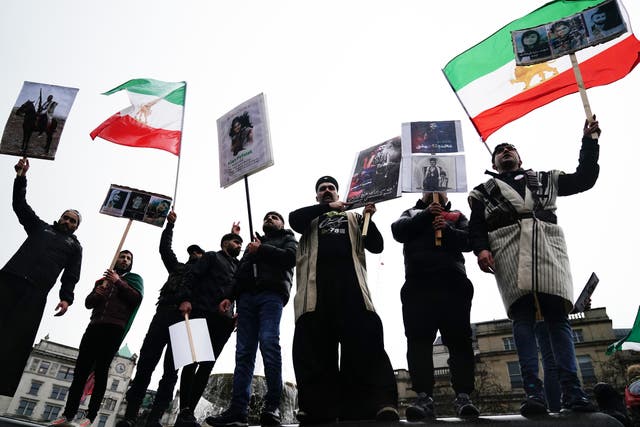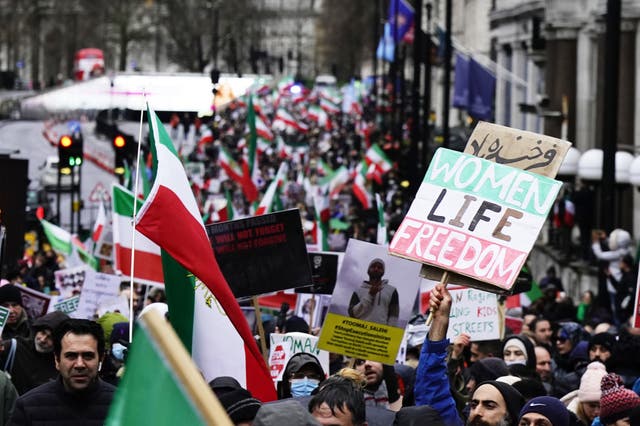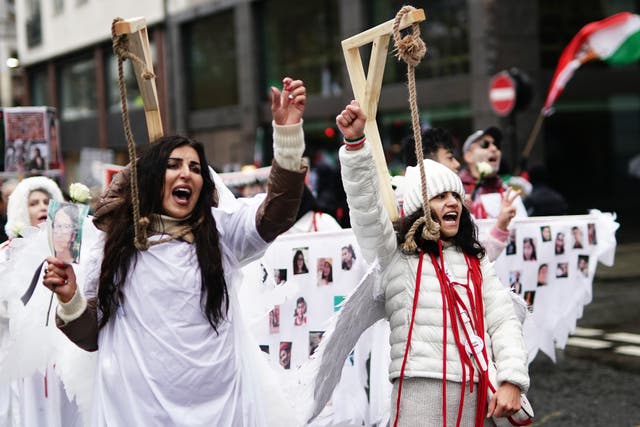Songül Karabulut, Preparatory Committee Member of the 2nd International Women's Conference, said that they would not just deal with a system analysis, but also discuss ways and means to get rid of the current predicament.
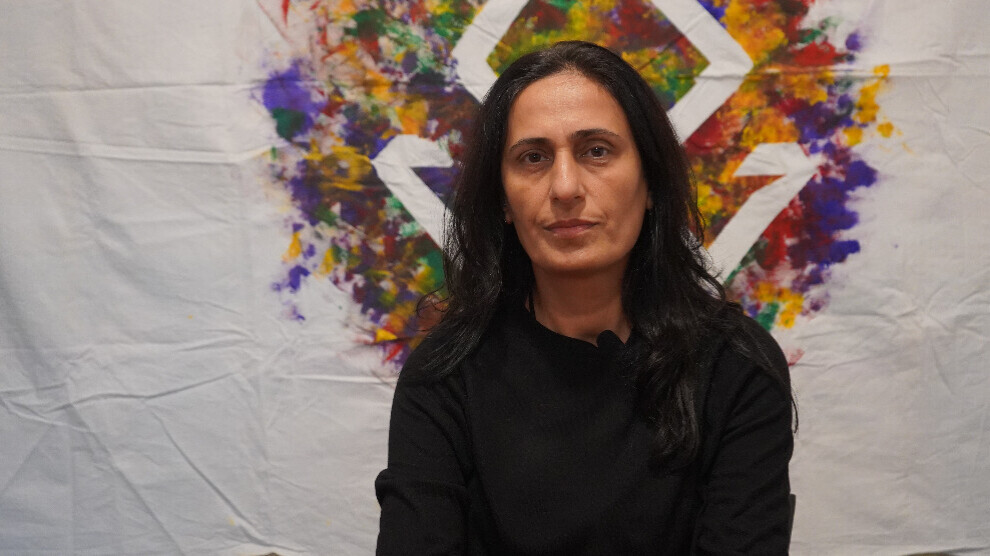
MUHAMMED KAYA
BERLIN
Friday, 4 Nov 2022
The ‘Women Are Shaping the Future Network’ will hold the 2nd International Women's Conference under the motto "Our Revolution: Liberating Life" at Berlin Technical University on November 5-6. Almost 800 women from 41 countries are expected to attend the conference.
Preparatory Committee Member Songül Karabulut spoke to ANF about the conference and pointed out that the women's revolution would pave the way for a more free, fair, ecological, and democratic life against the capitalist modernity system.
How are the preparations going on?
Our preparations are already completed. We are starting the registration process as of Friday (Nov. 4). The establishment of language cabins at the university will also be completed today because there will be simultaneous translation in 8 languages. Technical equipment will be installed. From 06:00 on Saturday, we will be present at the university. We'll start the conference at 09:00.
Why was the motto “Our Revolution: Liberating Life” chosen?
We are manifesting our philosophical approach. Women's liberation or women's revolution is to liberate life in general. When we were thinking about it, there were no mass protests or women-led uprising in Iran. The iconic motto 'Jin, Jiyan, Azadi' (Woman, Life, Freedom) of the protests in Iran has made the motto of our conference visible to the world once again. We think that the women's revolution will pave the way for a more free, fair, ecological and democratic life against the capitalist modernity system. We argue that the women's revolution will offer solutions to all the problems of capitalist modernity. We have consciously chosen this motto because women's liberation will naturally lead to liberation of life against the existing system of exploitation.
As you know, as the Kurdish Women's Movement, we declared the 21st century as the century of women in line with our leader's vision. Apart from theoretical-philosophical insights, the recent developments also confirm that our motto is relevant and in line with the Zeitgeist.
Compared to 2018, when the first conference was held, how do you evaluate the current situation?
In 2018, there were very serious women-led uprisings around the world. They were mainly about greater women's rights. For example, in Latin America, millions of women took to the streets against anti-abortion. Violence against women was a serious topic. In the Middle East, the Rojava Women's Revolution, led by the Kurdish Women's Movement, and women's self-defence exerted a serious influence across the world. Later, the global epidemic emerged, and women's struggles were also negatively affected by it. The Third World War has recently reached the borders of Europe. Following the Russia-Ukraine war, the contradictions are getting deeper and deeper. Governments are cracking down on citizens. That is, the pressures of capitalist modernity and nation-states towards the people are much more intense.
Afghanistan is very important to us. Afghanistan was handed over to the Taliban by the United States. The first thing they did was to oppress women again, to push them out of all areas of life, to suppress them. Afghan women continue to resist despite all the pressures. Afghan women announced that they were inspired by the Kurdish Women's Movement.
Now, there is a similar situation in Iran. Under the leadership of women, the motto 'Jin, Jiyan, Azadi' has emerged very clearly again. The struggle of women is gradually turning into a social struggle. Now, various segments of society, religious and ethnic groups, sexual differences are all chanting this slogan to express that they see their own freedom within the freedom of women. In this sense, the women's revolution has become more evident in 2022 than in 2018. Therefore, we will not just deal with system analysis during the conference, we will also discuss ways to get rid of the current predicament. We will pose questions like how we can fulfil our responsibility better and how we can generate the needed organization and struggle tools. We will discuss how to reach a common mentality and a common point of view. The conference aims to provide a response to the current situation.
How can those who cannot attend the conference follow it?
TV channels Jin TV and Stêrk TV will broadcast our conference live. Apart from that, we will also broadcast it live via the Internet. We want everyone to follow this conference. We live in the age of the Internet; distances don't matter anymore.
International Women's Conference in Berlin: “It is time to take responsibility for the future"
The ‘Women Are Shaping the Future Network’ holds the 2nd International Women's Conference under the motto "Our Revolution: Liberating Life" at Berlin Technical University on November 5-6.
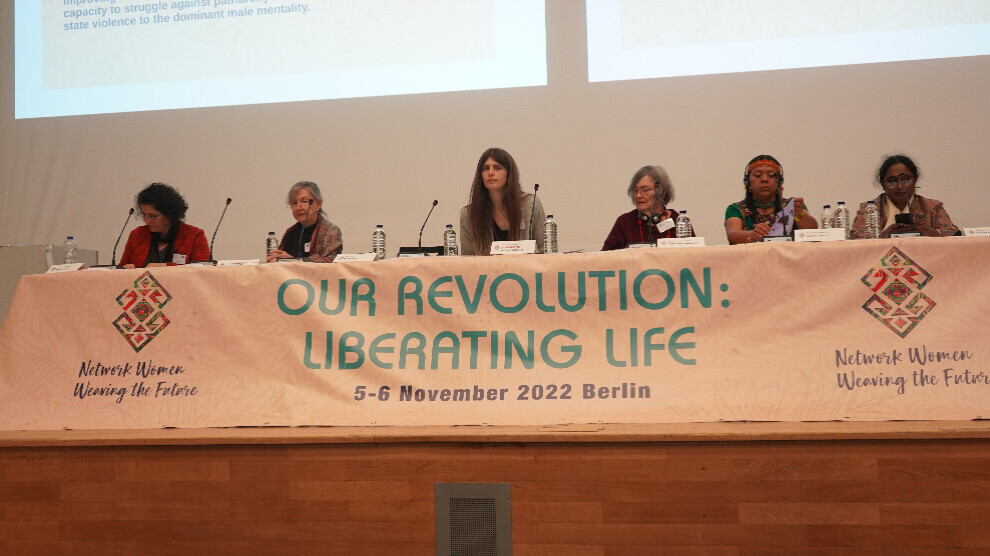
ANF
BERLIN
Saturday, 5 Nov 2022
The 2nd International World Conference on Women began in Berlin today. Around 700 women and other oppressed genders from all over the world have travelled to Berlin to participate in this powerful and revolutionary coming together.
In terms of content, the conference started with a deep examination of the Third World War as well as the resistance against it. Specifically, it was about the struggle against the highly armed capitalist patriarchy. Meghan Bodette of the Kurdish Peace Institute moderated and posed the following questions to the first session: What can the revolutionary liberation struggle of women and other oppressed genders do in this age of pandemics, wars, violent land grabs and ecological crises? The oppressive capitalist patriarchy continues its war against women and all other oppressed genders, developing ever new methods and strategies to break women's resistance and trying to hide all the contradictions of the system. How are women and other oppressed genders around the world currently resisting this capitalist patriarchy and what does it take for this movement to gain strength?
In the first part of the panel discussion, Nilüfer Koç, member of the Kurdistan National Congress (KNK), and Mariam Rawi from the Revolutionary Association of the Women of Afghanistan (RAWA) spoke about state violence against society as well as women and the means of oppression - dominant masculinity.
"Now is the right time to shape the future"
Koç stressed that now is exactly the right time to talk about how we as women should shape the future. “After all, what is happening around us right now is nothing less than World War III - even the US, NATO, etc. agree on this. But as women, we should not make the mistake of thinking of war only in military terms. There is a war that is not named as such: since the beginning of patriarchy, feminicide has been a war and an inherent part of capitalism. Military wars are only masks to disguise the relations and origins of the problems. That is why it is so necessary to find alternatives in this century. We as women need our own ideology - that of women's liberation,” said Koç and called for engagement with women's movements that are actively fighting for peace. She said that equal principles are needed to work together and create a global connection between women.
Koç went on to discuss the current crises, the hegemonic claims of the states and the resulting wars and competition. She mentioned collaboration at this point to destroy alternatives, such as in the fight against the Kurdish freedom movement and the attacks on Kurdistan. “At this moment, the oppressed have the chance to contradict and resist. In Iran, this is currently visible again. Behind the slogan "Jin, Jiyan, Azadî" (Woman, Life, Freedom) is a decades-long struggle that shows: if we are organised, we can win battles. In Kurdistan, we show that this is possible. It is time that we as sisters take responsibility for the future. Woman, Life, Freedom! That's how we will win."
"Women are proving that they are writing the history of the revolution”
Mariam Rawi then spoke of Afghanistan as a place where the most brutal religious fascists are currently ruling. She impressively described the tragedy that is taking place under this Islamist fundamentalist mentality. This is a force directed against women. Atrocities and women's suffering are the order of the day under this regime. Women are not recognised as human beings, but are reduced to child-bearing machines, she said.
However, Rawi also stressed that the Taliban were not alone, but linked to the institutions of capitalist states, such as the CIA. She gave a brief outline of the history of this cooperation. For example, she said, "women's rights" were used to legitimise the intervention after 2001, but even if today there is talk of its failure, in fact everything went according to the imperialist plan. Today, the country is on the verge of collapse, yet Western governments maintain relations with the Taliban: strategic interests are far more important than the fate of Afghan women and men, she noted.
But, she continued, people have also learned: values can only be fought for by the oppressed themselves - and then they will no longer be taken away. She went into detail about the work of RAWA: for more than 40 years they have been raising awareness of injustices and clandestinely organising women. For their work, the organisation was recently awarded the Sakine Cansiz Prize. "We were very happy about that."
Rawi concluded by saying, "We hope that the network of solidarity will become stronger and stronger. We swear by the blood of the struggling women to continue their journey. Women are proving that they are writing the history of the revolution."
Ecocide: overcoming domination, dispossession, oppression
The second part of the morning was dedicated to the destruction of nature and was entitled "Ecocide: overcoming domination, dispossession, oppression: the subordination and colonisation of nature and the ruthless appropriation and exploitation of resources". Here, Lolita Chavez from Feministas Abya Yala from Guatemala and Ariel Salleh, a sociologist and ecofeminist from Australia spoke.
From Abya Yala to Kurdistan
Chavez started her speech by lighting a fire and spoke words of gratitude for the earth, the cosmos: "This is our fire, our feminist fire, from Abya Yala to Kurdistan." She positioned herself against the war in Kurdistan and the use of chemical weapons, saying they were defenders of life.
She told of the occupation of indigenous territories, the exploitation and violence of criminal networks and terrorising structures. She stressed that these were also financed by Europe and its institutions: "We are here, telling you in your eyes: you are part of it." She spoke of the war that the extractivist companies were waging against them because they were holding their worlds against them, alternatives that were possible in their territories.
"Stop transnational corporations where they are born"
Chavez also denounced feminicide and called for justice. As feminists from Abya Yala, she said, they would work together, weaving autonomy and self-determination, but also sharing their wisdom. "We are not ashamed when they say we are witches. We stand by our spirituality. We are against ideologism because in our territories we decide."
Chavez ended her speech with two appeals. One, she said, was that there was now no time to delay the important project any longer: "Let's form these feminist networks and weave feminism from below!" Secondly, she called for, "Stop transnational corporations where they are born! Extractivist corporations are the wrong answer to global warming. And we will stop them!"
Overcoming dualist thinking
Ariel Salleh began her presentation by addressing the Rojava revolution, describing it as ecofeminist. She stressed that feminism and ecology denote a common struggle and are intertwined. She called for a struggle to be waged against the perpetuation of constructed dualisms and associated dissociative linkages. “The created dualistic thinking, for example between human beings and nature and linked to that of man and woman, not only limits our possibilities, but also leads to negative consequences, e.g. by portraying one side as inferior or opening the doors to colonialism. Humanity, reason, production are diametrically opposed to nature, chaos, reproduction and dominate them. This hierarchy is institutionalised in patriarchy. A lot of energy is needed to maintain male domination, which means alienation from life itself. Ecofeminists know about this connection with violence against women, and Abdullah Öcalan is also aware of this,” she said, and concluded by talking about successful ecofeminist struggles and emphasising her solidarity.
"Making Invisible Work Visible”
Concluding the first session, the third part focused on "Making Invisible Work Visible: The survival of the system is based on women's bad and unpaid work." This addressed the question: how can we base our class struggle on the principle of women's liberation to fight the foundations of capitalist exploitation? Women in class struggles have developed a view that the class hierarchy and the state are built on the exploitation of women's bodies and services. Under current capitalist conditions, women's labour is even more exploited and made even more invisible.
Abolish the system, not the human being
Genevieve Vaughan, an Italian American peace activist, feminist and philanthropist, made it clear in her lecture that the capitalist economy of the last centuries must be fundamentally abolished. “In order to push for a radical change of the economic system, we would have to understand unpaid labour as the standard of the system and paid labour as its deviation. Only then would we be able to see how women's bodies are exploited in capitalist patriarchy. Humans are the only species that cannot sustain themselves, but only stay alive by caring for each other. The maternal gift, she said, is invisible in the capitalist economy. This gift includes the creation of life and care, she noted.
Misogyny has historically kept women out of science and this has laid the groundwork for always developing models that would have voids in their analysis. We have to realise that we don't want the system to survive, we want our human species to survive. And our species consists of humans, who are neither Homo Economicus, i.e. profit-oriented, nor Homo Sapiens, i.e. knowledgeable, because we do not know who we are. The human being is a homo Donando, a giving human being.
Real security does not come from capitalist patriarchy
"Azadi means freedom in many languages" - with these words Kavita Krishnan, feminist activist of the All India Progressive Women's Association, began her contribution. She made it clear that in patriarchy the word security is used as a code for control and exploitation of women. To illustrate this situation in the system, Krishnan gave various examples from India and China to illustrate this shift in terms as a strategy to oppress women. In one example, she discussed the situation of young women who are recruited to work in factories of multinational companies. The managers promise the families that their daughters will work in safety, while their wages are only paid after three years. Even their mobile phones are partly taken away from them. Krishnan asked what kind of security is actually at stake. The security that should be at stake, she said, is one that should give protection from employers. The employer, however, becomes an ally of the family by de facto restricting women's freedom and preventing them from forming relationships with men outside their caste, from organising themselves, etc.
Krishnan stressed how important it is for feminist solidarity to be critical of supposedly anti-imperialist regimes. We must not close our eyes just because regimes claim to be anti-US. The same regimes, she said, understand LGBT struggles and feminism as Western values to be fought against.
The first session ended with an engaging Q&A session and many powerful expressions. There were repeated slogans and applause from the audience.

The second day of the international women's conference in Berlin is dedicated to the political prisoners who are imprisoned because of their struggle for freedom and who cannot participate in the exciting debates.
ANF
BERLIN
Sunday, 6 Nov 2022, 18:51
At the Technical University in Berlin, the international women's conference "Our Revolution: Liberating Life" of the network "Women Weaving Future" continued on the second day. The first day of the conference concluded with a concert by the Kurdish musician Yalda Abbasi.
The second day of the conference was dedicated to political prisoners. "We want to remember all political prisoners. There are many women who cannot be with us today because they are imprisoned for their struggle for freedom. The price they pay is their own freedom," the welcome address said.
KJAR: The women will not leave the streets
At the beginning of the programme, a video of the Community of Free Women of Eastern Kurdistan (KJAR) was shown in which a KJAR representative expressed her conviction that the revolution in Rojhilat (Eastern Kurdistan) and Iran would be successful: "A dictatorial regime has been in power for 43 years, that is enough. The women in Iran and Rojhilat had to live like slaves in society." The fascist regime could only be overthrown by women's hands, she said. The KJAR representative pointed out that women had been deprived of their freedom and systematically disenfranchised, among other things, by being forced to wear headscarves. “There are hundreds of women who have been raped, imprisoned or attacked with acid, but they hold their heads high. The women went to the barricades and would not leave the streets. Especially the Kurdish population continue the uprising so that the Kurdish woman, Jina Mahsa Amini, who was murdered by the Iranian morality police, is not forgotten. The slogan "Jin, Jiyan, Azadî" (Woman, Life, Freedom) is based on the legacy of decades of resistance in Kurdistan and destroys the ideology of the Iranian state. Men have also joined the protest and stood up together with women to fight against the state in which they see no hope,” said the KJAR representative who greeted the participants of the conference on behalf of the women of Rojhilat and wished them all success.
"From the balconies to the barricades"
The first session on the second day of the conference was moderated by Rahila Gupta, a freelance journalist and Southall Black Sisters activist from the UK. Rahila began by explaining that she had looked at Abdullah Öcalan's reading list, which included many feminist writers such as Judith Butler.
"How can the fragmentation of class, nationalism, religion caused by patriarchal mentality be overcome and how can we become independent of the thought structures of the male-dominated system?" the moderator asked, explaining that women's struggles would risk being reincorporated into the system unless a real alternative paradigm was developed - one based on intellectual and theoretical critique and capable of truly overcoming the limitations of the system.
The title of the session was "The life we dream of will not come through miracles, but through revolution" and was a quote from Abdullah Öcalan. The question of the session was "How do we get the women from the balconies to the barricades?" Part of the success of the Kurdish movement, she said, was based on the fact that activists went door to door to talk to everyone about what society should look like. The civil war in Syria created the right conditions for a "revolution within the revolution" in Rojava and it is important to reflect that the second wave of feminism was a significant foundation for Öcalan's work.
Women's revolution in Sudan
The first speaker was Shahida Abdulmunim from the Gender Centre for Research and Training in Sudan. The revolution in her country is also being made by women, said Shahida, explaining that for 80 years, since the beginning of the dictatorship in Sudan, women have been in the forefront of the resistance. In 1990-1999, almost only women were on the streets, fighting against the Bashir regime and celebrating great successes. During the 2018 uprising too, she said, women were prepared and led the struggles. They fought against toxic masculinity and patriarchy, the speaker explained. Abdulmunim noted that she herself was on the streets and was one of the participants in the revolution; 70 per cent of the people on the streets were women. These women came from 50 different groups and had to unite.
The patriarchal resistance and the state tried to weaken this movement, among other things, by appointing a woman to represent the movement. Three women became part of the government congress, but they were not representatives of the movement. Many laws were changed to the disadvantage of women. Shahida compared these laws to those of Iran. She said that 5000 women were in prison in Sudan for political reasons. “The regime even finances itself from the fines that women have to pay. The aim of the regime is to exclude half of the people in Sudan from political life. In my opinion, the hijab is not only a scarf, but prohibits women from participating and living in society.”
Shahida concluded: "What we wear, what we want, where we go, whether we wear a hijab or not, is not a religious issue, it is a political issue. We have to fight the regimes in our countries. We are fighting against neoliberalism and patriarchy, and we want to liberate our countries, to liberate ourselves!"
The Kurdish movement is one of the strongest democratic movements in Europe
The second speaker was Kurdish sociologist and author Dr Dilar Dirik, who began her speech by commemorating the journalist and Jineolojî researcher Nagihan Akarsel, who was murdered in Sulaymaniyah, Southern Kurdistan by the Turkish secret service MIT.
Dirik said that one has to talk about fragmentation on the global level. At the last conference, she said, there was talk about women's organising increasing, but at the same time there was also an increase in racist, fascist movements. “The Trumps, Erdoğans, Bolsonaros are the result of fascist movements, they represent the naked face of capitalist patriarchy. Liberalism is being imposed on the emerging women's struggles and "pinkwashing" is taking place in the face of NATO violence. Even their own movements are being appropriated by neoliberalism and made a product of capitalism. The capitalist system itself uses the image of women in struggle and tries to take over feminist movements.” Dirik asked, "What kind of resistance is allowed and which is criminalised? The Kurdish movement is a good example of this.”
“How, for example, did Daesh, the so-called "Islamic State", grow stronger and develop? This is an important question for the women's movement, so that something like this does not happen again.” With regards to the World Cup in Qatar, the speaker asked why no one was talking about the fact that the Islamist Al-Nusra Front was being co-financed by Qatar. Qatar, she said, is also at the forefront of supporting the Taliban.
Dilar Dirik went on to say that it is necessary to get out of the discourse that Turkey is a rogue state and should be excluded from NATO. “Rather, Turkey is an integral part of NATO. Knowledge production should not be left to the states. The German Foreign Minister, who adorns herself with the slogan "Jin Jiyan Azadî", actively supports those forces that attack women. The propaganda of the Western states is so powerful that many people do not even know how many crimes NATO commits, which wars it finances and which are waged in its name. Of course, it is always easier to criticise countries that are not in NATO and to declare them the enemy.”
Dirik explained that the Kurdish movement is also one of the strongest democratic movements in Europe. Despite massive criminalisation, it is able to organise protests across Europe in a very short time, she added. “It is not possible to understand the fragmentation of the protests if fascist movements are only analysed locally. Women's movements worldwide should not only deal with the cultural problems of their own nations. Rather, it is necessary to ask how the government of one's own country is involved in the creation, financing and building of Islamist, fascist organisations worldwide.”
The conference, she said, is a good example that women can organise without the state - freely and autonomously. In conclusion, Dirik demanded that the movement must radicalise itself and overcome liberalism. Likewise, it must fight to ensure that its own slogans are not stolen by the system.
Feminism as the rebellion of the oldest colony
The second part of the session was titled "Feminism - the rebellion of the oldest colony and what lies behind it". Rahila Gupta posed the question: "What has been the role and contribution of feminism to the struggle of women in the past and present? What are the causes of the obstacles that feminism faces? How can feminism adopt an anti-system stance?"
The situation of women in Yemen
Dr Anjila al-Maamari from the Centre for Strategic Studies in Support of Women and Children from Yemen explained that Yemen is located in the south of the Arabian Peninsula, on the border with Saudi Arabia, which makes Yemen a geostrategically important place. Anjila thanked all the women for coming together at the conference and explained how difficult it was to get in and out of Yemen. The women's revolution will always continue, she said. “Yemen has been at war for eight years, so the human rights situation is very difficult. 20 million people are threatened by the war. There are four million refugees, most of them children and women. The issue of sexism is very entrenched and it is difficult to be a woman in Yemen. Every fifth woman has psychological problems. Women have been fighting a long social battle to be able to participate in political and social life. It is clear that there are a lot of restrictions for them.”
“Half of Yemen's population of 25 million people are women, but there is only one woman in parliament. There are 30 male representatives in the ministries and only one female. The UN is not doing enough, although women are very involved. Women are also underrepresented at peace conferences like the one in Geneva. There is no political will in the system to bring women into the political arena. Among other things, women are not allowed to go out on the streets without male accompaniment. There were also no women present at the discussions on a political solution in Stockholm. However, women must be present when laws are developed to assist women. The current government was formed in April 2021. There is not a single woman in the government. It is completely male. To make this invisible, only a few women have been appointed to committees. In contrast to the 1962 revolution, in which most of the activists were men, women were in the front row in the 2011 revolution, which was a big change.”
Argentina: Ni Una Menos
Next to speak was author and activist Marta Dillon from the "Ni Una Menos" movement in Argentina. At the beginning of her talk, loud chants rang out in the hall to show solidarity with the movement: "Ni una menos - vivas nos queremos!". Marta Dillon prefaced her talk by saying that she had brought with her the love of various women fighters from Abya Yala who defend their land every day against neoliberal-capitalist extractivism while facing the terrorist violence of the state. In doing so, Marta made visible that from Abya Yala to Kurdistan, there is struggle everywhere and all revolutionary women's struggles against capitalist patriarchy are interconnected worldwide.
Ni Una Menos was formed in 2015 to take to the streets as an intersectional feminist movement against feminicide and to make visible patriarchal violence linked to capitalism and colonialism. Only in this way, said Marta Dillon, can patriarchal violence and its most definitive form, feminicide, be properly addressed. The "Ni Una Menos" movement places itself in the tradition of the Mothers of the Plaza de Mayo and all the struggling women during the dictatorship in Argentina and thus sees itself as part of a feminist struggle that also opposes state terror, which is partly responsible for the exploitation and oppression of women. The movement is an amalgamation of different groups and identities that take to the streets for the life and memory of women and transpersons who have been victims of feminicide. They make visible that feminicides are never private, but always a political issue that affects everyone in society. After this movement grew bigger and bigger in Argentina, but also in many other countries that joined this impulse, a political strike was called by Ni Una Menos in 2016. The strike serves as a tool to make visible the exploitation of women and their work, bodies and care. The strike made clear that women are robbed of their life-time by capitalist patriarchy. Marta Dillon said that women were reclaiming this lifetime through autonomous feminist organising with each other. The international women's conference, she said, is an example of this. The strike was a means of further tightening the net between the struggles, which the Kurdish women's movement had invited at the conference. In conclusion, Marta Dillon summarised her demands in a trend-setting way: We need a feminism that distinguishes itself from conservative and liberal feminism. Only with an intersectional understanding of capitalist patriarchy can women liberate themselves. The patriarchal state owes women and colonised people the life in freedom to which they are entitled.
Sociology of Freedom and Jineolojî
The first speaker in the third part of the session entitled "Sociology of Freedom and Jineolojî" was Elif Kaya from the Jineolojî Centre Europe. She explained the role that Jineolojî will play in transforming the values, experiences and knowledge that emerge from the women's revolution and enter social culture. "An intellectual search based on an alternative paradigm can make the values of the women's resistance the basis of the revolution," Elif said, also remembering Nagihan Arkasel, who worked at the Jineolojî Centre in Sulaymaniyah until her assassination. Elif greeted the women from Abya Yala and the political prisoners and introduced the question: "What is the difference between Jineoloji and other feminisms? What paradigm guides us?"
“Scientific approaches cannot answer this question. The basis is the sociology of freedom. The revolution focuses on the change of the social. Every revolution is connected with freedom. After revolutions, more conservative paths could also emerge, as for example in Iran at the time. This revolution did not have freedom as its basis and therefore also led to the murder of Jina Amini. Sociology was founded in the 18th century to understand society after industrialisation, but it took a positivist direction. These sciences are not suitable for understanding the social. Metaphysical aspects have been left out. The sociology of freedom offers a way out and opens up a holistic horizon. Multiplurality is the basis for this. A connection between sociology and history is being re-established.”
Elif explained that in 2017, scientific work began in Rojava to explain the ideological basis of the revolution. “This is how the Jineolojî works, for example through the publication of books. Positivist science hides women's knowledge, while Jineoloji places this knowledge at the centre and establishes the role of women and their visibility. Jineoloji rejects patriarchal knowledge production. The slogan "Jin Jiyan Azadî" establishes the connection between knowledge and women's lives. Knowing who we are and where we want to go means developing practice. Science must develop solutions to existing problems. Jineolojî is a young science that makes it possible to present women's perspectives, but also passion and hope. The concept of Xwebûn ("being oneself") means to stand against one's own alienation with the roots of knowledge.
The next speaker was feminist activist and philosophy professor Jules Falquet from France, who addressed the question: "What do we mean by liberating people from the grip of patriarchy? What does liberation from gendered forms of power relations and the definition of women and men by overcoming gender mean? What are the building blocks of a philosophy of life that will change and transform social relations?"
Jules recalled Bertha Cacerés, Rosa Luxemburg and all the other murdered revolutionaries, and said of her own life story that she was rather privileged, as a woman-born, white French woman, from a country that was the third largest exporter of arms in the world. “Politically, I try to fight against colonialism, sexism and capitalism. I see myself as a feminist and lesbian in the sense of Monique Vitti and try not to be a "woman" anymore, that is, to escape oppression. I lived in Abya Yala in Ecuador from 1992-94 with ex-guerrillas when the Zapatista movement was rising. I also lived with a Kurdish fighter and participated in the 1st Zapatista Congress, and co-founded a feminist lesbian network. I am an activist, but very interested in scientific methodology.”
The activist said it was interesting that young and enthusiastic women were present as well as experienced militants, including many racialised women. “This is different from the past and says a lot about the knowledge that is being generated. The power of the new demands also lies in this. The struggles under the slogan "Jin Jiyan Azadî" also include looking at the dimension of social reproduction. Women, and especially migrants from southern countries, are in key positions for this.”





